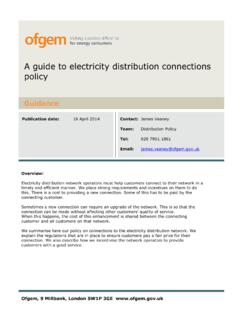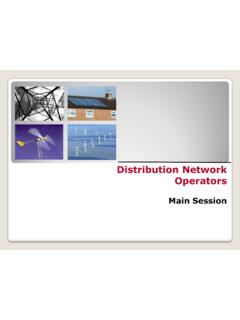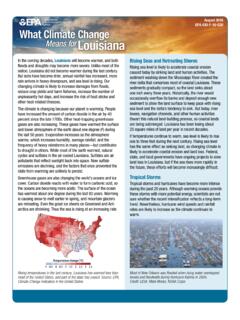Transcription of Why are energy prices rising? - Office of Gas and ...
1 Promoting choice and valueConsumers are facing tough economic times including increasing energy prices . This factsheet explains why energy prices are energy prices workThe price you pay for your energy is dependent on several things. About half of your bill is the wholesale cost of gas and electricity, but there is also the cost of distribution, transmission charges, government tax (VAT), environmental costs and meter provision - as well as your energy company s supply costs and profit. While the environmental and network costs are increasing it is wholesale energy costs, which can fluctuate widely and are dependent on global prices , that are having the greatest impact on energy bills.
2 This factsheet looks at the factors behind rising energy prices in more detail. What s driving up energy pricesHigher gas prices have been the main driver of increasing energy bills over the last eight years. As the graph below shows, Britain enjoyed a period of falling gas prices until 2004/05. This is the year that Britain first imported more gas than it produced itself. Becoming more reliant on imported gas has meant that British gas prices have become increasingly influenced by global events, especially those that affect the oil prices as often European gas prices are linked to the oil price.
3 Why are energy prices rising ?for all gas and electricity customersFactsheet 108 -90 Sep-91 Jun-92 Mar-93 Dec-93 Sep-94 Jun-95 Mar-96 Dec-96 Sep-97 Jun-98 Mar-99 Dec -99 Sep-00 Jun-01 Mar-02 Dec-02 Sep-03 Jun-04 Mar-05 Dec-05 Sep-06 Jun-07 Mar-08 Dec -08 Sep-09 Jun-10 Mar-11 Annual bill ( )IncumbentAverage best offerAverage billHistorical Standard Credit Gas prices June 1986 - September 2011 Updated graph based on revised average consumption level of 16500 kWh per customer, per year for a standard tariff. Ofgem analysis on data from from 2003 2011, data prior to this date is owned by are energy prices rising ?
4 Factsheet oil price is now a big driver of GB gas prices . This is because during periods of high demand in winter, Britain needs to attract flows of gas through the pipelines that connect Britain with Belgium and Norway. And to attract this gas, the GB price has to be at least as high as the gas price on mainland Europe. As the gas price in mainland Europe is largely linked to the oil price, gas prices in Britian also become dependent on the price of oil. A large portion (35-50%) of electricity generated in the GB is done by burning gas. And as around 50% of the wholesale electricity price is made up of the costs of the fuels used to generate the electricity, changes in the gas prices will also signifcantly affect the electricity price.
5 What else is affecting prices ?We estimate that between now and 2020 Britain needs to invest up to 200 billion to meet its environmental targets and to secure energy supplies. At the moment, the cost of Government environmental and energy efficiency programmes adds around 100 on to the average energy bill of 1,300. However, greater reliance on non-fossil fuels such as nuclear and renewables, could reduce Britain s dependence on gas imports. The Government is currently proposing major reforms to the electricity industry, to attract the necessary investment to replace aging nuclear stations and coal fired power stations which do not meet EU emissions standards.
6 Network costs, which make up around 20 per cent of your bill, will also have to increase. We estimate that around 30 billion will be needed to be spent over the the next ten years on our energy networks to replace aging infrastructure, support the drive to a low carbon economy and connect to new supplies of gas. This will increase network costs by around 60 over the next ten is the future for gas supplies? The graph below shows the winter gas price this year, compared to last year. In the short-term, gas prices have risen due to a number of factors: The oil price is high by historical standards.
7 Increasing demandfrom developing countries, notably China, has helped push upoil prices over the last decade. In the past year oil prices have also been kept high by the ArabSpring , which affected production of oil from Libya and raisedfears that production may be further affected by instability inother major oil producing countries in the region. The GB gas price may have also been affected by the tsunamiand subsequent nuclear closures in Japan this year. This hasled to Japan to increase its demand for shipments of LiquifiedNatural Gas (LNG), putting pressure on world LNG prices . Overthe summer months this year, a third of GB gas supplies camefrom LNG; higher world LNG prices are likely to put upwardpressure on GB as a result of these factors, the winter gas price for 2011/12 is around 40 per cent higher than last s energy market has delivered over 10 billion of investment in new importation facilities.
8 This gives Britain a very diverse mix of gas sources, ranging from LNG terminals which can import gas from around the world, to pipelines which connect us to Norway and Europe. However, in the long-term the future of gas supplies will depend on global supply and demand. On the supply side two important factors are how gas supplies from Russia and Central Asia are developed, along with the impact European shale gas might have on gas supplies. Future demand from Asia and around the world will also have an impact on Britain as we compete on the world market for gas supplies. 3035404550556065707580 Gas price (p/th)31 Jan28 Feb31 Mar30 Apr31 May30 Jun31 Jul31 Aug30 Sep31 Oct30 Nov31 Dec31 Jan28 Feb31 Mar30 Apr31 May30 Jun31 Jul31 Aug30 SeptWinter 11/12 gas priceWinter 10/11 gas priceWinter wholesale gas price comparision: 2010 vs 2011 Wholesale markets allow you to buy gas in advance of its delivery date, at an agreed price (known as hedging).
9 This graph compares gas prices for delivery in Winter 2011/12 and Winter 2010/11. On 31 October 2010, gas for delivery last winter (the red curve) was roughly the same price as gas for deliver this winter (the blue curve). However, since then, gas for delivery in Winter 2011/12 gas rose significantly in are energy prices rising ?Factsheet media enquiries contact:Lydia Fitzpatrick, Senior Communications Manager 020 7901 7419 email Chris Lock, Senior Press Officer 020 7901 7225 email How do Britain s energy prices compare with the rest of Europe?Britian s domestic energy prices are still relatively low compared to most European countries, although the latest data we have doesn t take into account all the recent GB price rises.
10 However, this is also a reflection of the different tax rates across s role As regulator we don t control prices price decisions are down to energy suppliers. Our role is to promote competition and regulate where necessary to protect the interests of consumers. This means we do not regulate retail prices , rather we make sure the market is competitive to keep pressure on prices , profits and service quality. We also regulary publish information for consumers on the link between retail and wholesale prices . Plans for reformOur recent investigation into the energy market concluded that energy companies were failing consumers by stifling competition through a combination of tariff complexity, poor supplier behaviour and lack of transparency.

















